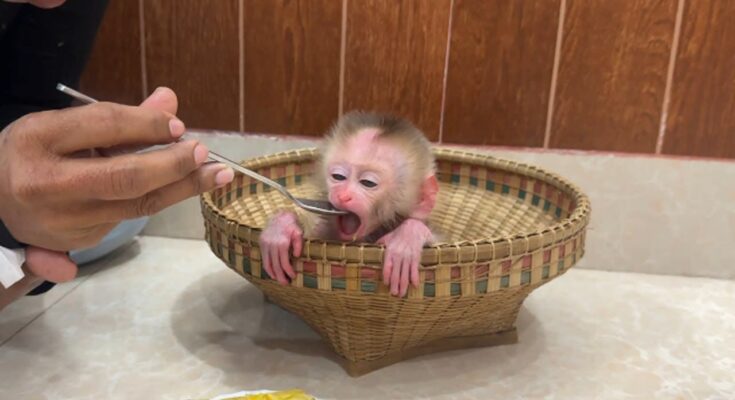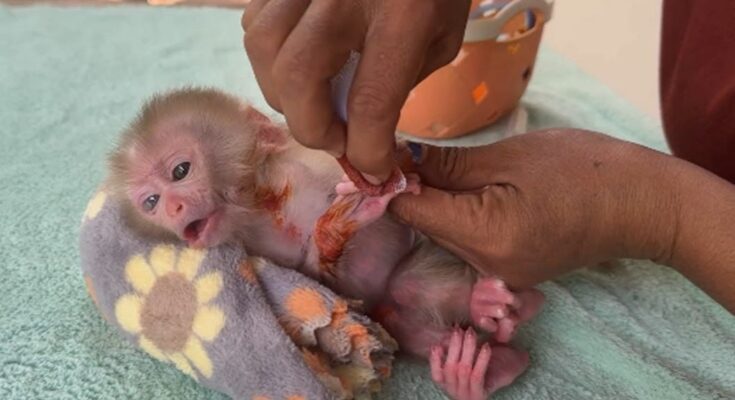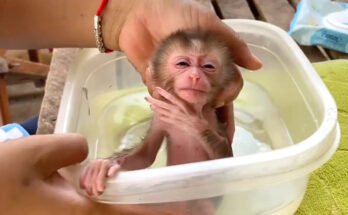Welcome Your Baby Monkey with Love! 🐒❤️ Discover essential care tips for nurturing your newborn primate. From nutrition and bonding to creating a safe environment, learn how to ensure your little monkey thrives. Explore expert advice and fun facts about their unique needs. Start your adventure in primate parenting now!
Can People in the USA Feed a Baby Monkey?
Baby monkeys are undeniably adorable, but can people in the USA legally care for and feed one? Let’s dive into the facts.
Legal Considerations
Feeding and caring for a baby monkey isn’t just a matter of having the resources; it involves legalities. Laws regarding the ownership and care of monkeys vary by state. Some states allow it with permits, while others have outright bans. For example:
- Allowed with restrictions: Florida, Texas
- Prohibited: California, New York
Before you even consider feeding or owning a baby monkey, ensure you are fully compliant with your state’s regulations.
Dietary Needs of a Baby Monkey
Baby monkeys require specialized care and a proper diet. Their diet typically includes:
- Formula designed for primates (not human baby formula).
- Fresh fruits and vegetables like bananas, mangoes, and leafy greens.
- Occasional protein sources such as eggs or mealworms.
Feeding a baby monkey improperly can lead to malnutrition and health problems.
Challenges of Raising a Baby Monkey
Raising a monkey is not the same as raising a cat or dog. They require constant attention, socialization, and an enriched environment to thrive. Monkeys are highly intelligent and can become stressed or even aggressive if their needs aren’t met.
Alternatives to Feeding a Baby Monkey
If you’re drawn to baby monkeys, consider alternatives:
- Volunteering at a wildlife sanctuary.
- Supporting primate conservation programs.
These options allow you to connect with monkeys without the responsibility of ownership.
Pity Adorable Newborn Baby Monkey In…

Thinking about having a monkey as a pet? Here’s everything you need to know before making the big decision!”
Feeding a pet monkey: Is it safe and responsible? Learn what to consider before offering food to these intelligent yet sensitive animals.
Feeding a pet monkey at home is a complex responsibility that requires understanding their unique dietary needs. Monkeys need a balanced diet, including fresh fruits, vegetables, and sometimes specialized primate food to maintain their health. However, giving them human snacks or an improper diet can lead to severe health issues. It’s crucial to consult with a veterinarian or primate expert to ensure you’re meeting their nutritional needs safely and responsibly. Before feeding, consider if you’re equipped to handle their care properly, as keeping a monkey as a pet also involves understanding their behavior and long-term welfare.
Step-by-Step Guide to Feeding a Baby Monkey 🍼🐒
- Understand Their Diet
Baby monkeys require a diet similar to what they’d consume in the wild. Start with specialized milk formulas for primates or fruits like bananas and papayas. - Sanitize Feeding Tools
Always use clean bottles, syringes, or bowls to prevent infections. Hygiene is crucial for their health. - Feed Small Portions
Begin with small amounts to avoid overfeeding. Monitor how much they eat to adjust as they grow. - Maintain a Feeding Schedule
Feed baby monkeys every 2–3 hours for newborns, gradually spacing it out as they age. - Observe Behavior
Watch for signs of hunger or discomfort. If they seem distressed, consult a vet experienced with exotic animals. - Provide Fresh Water
Ensure they have access to clean water at all times for hydration. - Introduce Solid Foods Gradually
Around 6–8 weeks, begin introducing soft fruits and vegetables alongside milk. - Create a Bond While Feeding
Feeding time is a great opportunity to build trust. Be gentle and patient. - Consult a Vet Regularly
Regular health checks ensure the baby monkey is growing strong and healthy.
Baby monkeys are incredibly fascinating creatures with a mix of intelligence, curiosity, and playfulness that captures the hearts of many. Here are some interesting facts about baby monkeys:
1. Strong Family Bonds
Baby monkeys are often raised in close-knit family groups. Their mothers play a vital role in their upbringing, providing food, protection, and teaching them essential survival skills. In some species, other members of the troop, like siblings or aunts, also help care for the baby.
2. Long Periods of Dependency
Unlike many other animals, baby monkeys spend a lot of time with their mothers. This dependency can last months or even years, depending on the species. During this time, they learn important behaviors like foraging, climbing, and social interaction.
3. Playful and Curious Nature
Baby monkeys are naturally curious and love to explore their surroundings. Play is an essential part of their development, helping them build strength, agility, and social skills. Watching their playful antics is both entertaining and educational.
4. Unique Communication
Even as infants, monkeys have a variety of ways to communicate. They use facial expressions, vocalizations, and body language to express needs or emotions like hunger, fear, or excitement.
5. Diverse Diets
The diet of a baby monkey largely depends on its species. Initially, they rely on their mother’s milk, but as they grow, they are introduced to fruits, leaves, seeds, and insects. Their diet is critical for healthy development.
6. Species-Specific Characteristics
Each species of monkey has unique traits. For instance:
- Capuchin monkeys: Known for their cleverness, baby capuchins are quick learners.
- Macaques: Highly social, their young are often seen interacting with many troop members.
- Howler monkeys: Even as infants, they are vocal and can be heard from far distances.
7. Emotional Depth
Baby monkeys display a wide range of emotions, from joy to sadness. They form strong attachments to their mothers and can feel distressed if separated.
8. Endearing Behaviors
It’s common to see baby monkeys clinging tightly to their mother’s back or chest. This not only keeps them safe but also strengthens their bond.
9. Conservation Challenges
Sadly, many monkey species face threats like habitat destruction and poaching. Orphaned baby monkeys are often rescued by wildlife organizations, where they are rehabilitated and sometimes reintroduced to the wild.
10. Human-Like Traits
Because monkeys are primates, like humans, their behaviors can sometimes feel eerily similar to ours. From learning by imitation to showing affection, baby monkeys remind us of how connected all life is.
Whether you’re observing them in the wild, in sanctuaries, or through videos, baby monkeys are sure to bring a smile to your face with their charm and energy! 🐒💛



